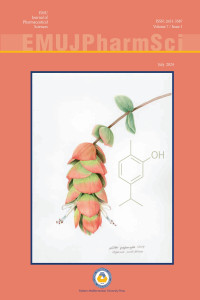Antibacterial Potency of Ibuprofen and Its Interaction with Ciprofloxacin Against Gram Positive and Gram Negative Bacteria
Abstract
Ibuprofen, a nonsteroidal anti-inflammatory drug (NSAID), works by reducing hormones for the treatment of fever, inflammation, and pain. Previously, it was only shown that the Ibuprofen inhibits the effect of various bacteria that are stimulated by bacterial infections and not directly on bacterial cells. In this study, we aimed to investigate antibacterial and synergistic activities of Ibuprofen against Enterococcus faecalis ATCC 29212, Staphylococcus aureus ATCC 25923, Escherichia coli ATCC 25922 and Klebsiella pneumoniae ATCC 700603. The results revealed promising antibacterial activity against tested Gram-positive bacteria, but there was no effect on Gram-negative bacteria. Furthermore, checkerboard assays did not reveal any additive or synergistic activity when combined with ciprofloxacin against tested Gram-positive bacteria. Collectively, our data reveal the selective antibacterial activity of ibuprofen against Gram-positive bacteria which suggests that ibuprofen can be further investigated as a potential source for new therapeutic options.
Keywords
Antibacterial Checkerboard Ciprofloxacin Enterecoccus faecalis Ibuprofen Staphylococcus aureus.
References
- Bellio P, Fagnani L, Nazzicone L and Celenza G (2021). New and simplified method for drug combination studies by checkerboard assay. MethodsX 8: 101543.
- Bernard GR, Wheeler AP, Russell JA, Schein R, Summer WR, et al. (1997). The effects of ibuprofen on the physiology and survival of patients with sepsis. New Engl J Med 336: 912-918.
- Byrne ST, Denkin SM and Zhang Y (2006). Aspirin and ibuprofen enhance pyrazinamide treatment of murine tuberculosis. J Antimicrob Chemother 59: 313-316.
- Celik I, Akbulut A, Kilic SS, Rahman A, Vural P, et al. (2002). Effects of Ibuprofen on the physiology and outcome of rabbit endotoxic shock. BMC Infect Dis 2: 26-38.
- Graham DY, Klein PD, Opekun AR, Smith KE, Polasani RR, et al. (1989). In vivo susceptibility of Campylobacter pylori. Am J Gastroenterol 84: 233-238.
- Sordelli DO, Cerquetti MC, El-Tawil G, Ramwell PW, Hooke AM, et al. (1985). Ibuprofen modifies the inflammatory response of the murine lung to Pseudomonas aeruginosa. Eur J Respire Dis 67: 118-127.
- Wikler MA (2006). Methods for dilution antimicrobial susceptibility tests for bacteria that grow aerobically: Approved standard, vol. 26, p M7–A7. CLSI, Wayne, Pennsylvania.
- Zgurskaya HI and Rybenkov V (2019). Permeability barriers of Gram-negative pathogens. Ann N Y Acad Sci 1459: 5-18.
Abstract
References
- Bellio P, Fagnani L, Nazzicone L and Celenza G (2021). New and simplified method for drug combination studies by checkerboard assay. MethodsX 8: 101543.
- Bernard GR, Wheeler AP, Russell JA, Schein R, Summer WR, et al. (1997). The effects of ibuprofen on the physiology and survival of patients with sepsis. New Engl J Med 336: 912-918.
- Byrne ST, Denkin SM and Zhang Y (2006). Aspirin and ibuprofen enhance pyrazinamide treatment of murine tuberculosis. J Antimicrob Chemother 59: 313-316.
- Celik I, Akbulut A, Kilic SS, Rahman A, Vural P, et al. (2002). Effects of Ibuprofen on the physiology and outcome of rabbit endotoxic shock. BMC Infect Dis 2: 26-38.
- Graham DY, Klein PD, Opekun AR, Smith KE, Polasani RR, et al. (1989). In vivo susceptibility of Campylobacter pylori. Am J Gastroenterol 84: 233-238.
- Sordelli DO, Cerquetti MC, El-Tawil G, Ramwell PW, Hooke AM, et al. (1985). Ibuprofen modifies the inflammatory response of the murine lung to Pseudomonas aeruginosa. Eur J Respire Dis 67: 118-127.
- Wikler MA (2006). Methods for dilution antimicrobial susceptibility tests for bacteria that grow aerobically: Approved standard, vol. 26, p M7–A7. CLSI, Wayne, Pennsylvania.
- Zgurskaya HI and Rybenkov V (2019). Permeability barriers of Gram-negative pathogens. Ann N Y Acad Sci 1459: 5-18.
Details
| Primary Language | English |
|---|---|
| Subjects | Pharmaceutical Microbiology |
| Journal Section | Research Articles |
| Authors | |
| Publication Date | July 22, 2024 |
| Submission Date | June 28, 2024 |
| Acceptance Date | July 9, 2024 |
| Published in Issue | Year 2024 Volume: 7 Issue: 1 |


